(CNN) -- The U.N. Security Council unanimously passed tougher sanctions against North Korea Thursday targeting the secretive nation's nuclear program hours after Pyongyang threatened a possible "preemptive nuclear attack."
"These sanctions will bite, and bite hard," U.S. Ambassador to the United Nations Susan Rice said after the vote.
China, North Korea's key ally, could have used its veto power to block the sanctions. Instead, after weeks of negotiating, it signed on to the final draft.
"China is a country of principle," China's U.N. Ambassador Li Baodong said. "We are firmly committed to safeguarding peace and stability on the Korean peninsula."
.cnnArticleGalleryNav{border:1px solid #000;cursor:pointer;float:left;height:25px;text-align:center;width:25px} .cnnArticleGalleryNavOn{background-color:#C03;border:1px solid #000;float:left;height:25px;text-align:center;width:20px} .cnnArticleGalleryNavDisabled{background-color:#222;border:1px solid #000;color:#666;float:left;height:25px;text-align:center;width:25px} .cnnArticleExpandableTarget{background-color:#000;display:none;position:absolute} .cnnArticlePhotoContainer{height:122px;width:214px} .cnnArticleBoxImage{cursor:pointer;height:122px;padding-top:0;width:214px} .cnnArticleGalleryCaptionControl{background-color:#000;color:#FFF} .cnnArticleGalleryCaptionControlText{cursor:pointer;float:right;font-size:10px;padding:3px 10px 3px 3px} .cnnArticleGalleryPhotoContainer cite{background:none repeat scroll 0 0 #000;bottom:48px;color:#FFF;height:auto;left:420px;opacity:.7;position:absolute;width:200px;padding:10px} .cnnArticleGalleryClose{background-color:#fff;display:block;text-align:right} .cnnArticleGalleryCloseButton{cursor:pointer} .cnnArticleGalleryNavPrevNext span{background-color:#444;color:#CCC;cursor:pointer;float:left;height:23px;text-align:center;width:26px;padding:4px 0 0} .cnnArticleGalleryNavPrevNextDisabled span{background-color:#444;color:#666;float:left;height:23px;text-align:center;width:25px;padding:4px 0 0} .cnnVerticalGalleryPhoto{padding-right:68px;width:270px;margin:0 auto} .cnnGalleryContainer{float:left;clear:left;margin:0 0 20px;padding:0 0 0 10px}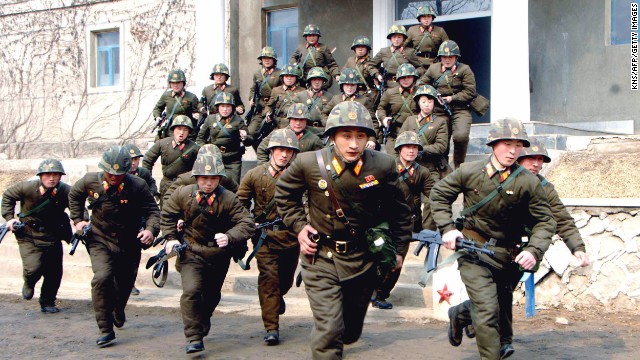 Soldiers in the North Korean army train at an undisclosed location on Wednesday, March 6, in a photo from the state-run Korean Central News Agency. North Korea has escalated its bellicose rhetoric, threatening nuclear strikes, just before the U.N. Security Council passed tougher sanctions against the secretive nation on Thursday, March 7. North Korean leader Kim Jong Un, center, poses with chiefs of branch social security stations in this undated picture released by North Korea's official news agency on November 27, 2012. Kim celebrates with staff from the satellite control center in Pyongyang, North Korea, during the launch of a rocket carrying a satellite, in a photo released by the official North Korean news agency on December 12. A crowd watches as statues of the nation's founder, Kim Il Sung, and his son Kim Jong Il are unveiled during a ceremony in Pyongyang on April 13, 2012. Photos from North Korea are rare, but the country was on full display in April 2012 as it celebrated the 100th birthday of Kim Il Sung. A North Korean soldier stands guard in front of an Unha-3 rocket at the Tangachai-ri Space Center on April 8, 2012. A military vehicle participates in a parade in Pyongyang on April 15, 2012. North Koreans wave flags in front of portraits of Kim Il Sung, left, and his son Kim Jong Il during celebrations to mark the 100th birth anniversary of Kim Il Sung in Pyongyang on April 16, 2012. North Korean soldiers relax at the end of an official ceremony attended by leader Kim Jong Un at a stadium in Pyongyang on April 14, 2012. Kim Jong Un applauds as he watches a military parade in Pyongyang on April 15, 2012. A North Korean soldier stands on a balcony in Pyongyang on April 16, 2012. North Korean soldiers march during a military parade in Pyongyang on April 15, 2012. Soldiers board a bus outside a theater in Pyongyang on April 16, 2012. North Korean performers sit below a screen showing images of leader Kim Jong Un in Pyongyang on April 16, 2012. North Korean soldiers salute during a military parade in Pyongyang on April 15, 2012. Kim Jong Un visits the Rungna People's Pleasure Ground, which is under construction in Pyongyang, in a photo released on July 3, 2012, by North Korea's official Korean Central News Agency. North Korean soldiers listen to a speech during an official ceremony attended by leader Kim Jong Un at a stadium in Pyongyang on April 14, 2012. Members of a North Korean military band gather following an official ceremony at the Kim Il Sung stadium in Pyongyang on April 14, 2012. North Korean military personnel watch a performance in Pyongyang on April 16, 2012. A North Korean controller is seen along the railway line between Pyongyang and North Pyongan province on April 8, 2012. A North Korean military honor guard stands at attention at Pyongyang's airport during a diplomatic visit on May 2, 2001. Kim Jong Un and North Korea's military Kim Jong Un and North Korea's military Kim Jong Un and North Korea's military Kim Jong Un and North Korea's military Kim Jong Un and North Korea's military Kim Jong Un and North Korea's military Kim Jong Un and North Korea's military Kim Jong Un and North Korea's military Kim Jong Un and North Korea's military Kim Jong Un and North Korea's military Kim Jong Un and North Korea's military Kim Jong Un and North Korea's military Kim Jong Un and North Korea's military Kim Jong Un and North Korea's military Kim Jong Un and North Korea's military Kim Jong Un and North Korea's military Kim Jong Un and North Korea's military Kim Jong Un and North Korea's military Kim Jong Un and North Korea's military Kim Jong Un and North Korea's military HIDE CAPTION << <
Soldiers in the North Korean army train at an undisclosed location on Wednesday, March 6, in a photo from the state-run Korean Central News Agency. North Korea has escalated its bellicose rhetoric, threatening nuclear strikes, just before the U.N. Security Council passed tougher sanctions against the secretive nation on Thursday, March 7. North Korean leader Kim Jong Un, center, poses with chiefs of branch social security stations in this undated picture released by North Korea's official news agency on November 27, 2012. Kim celebrates with staff from the satellite control center in Pyongyang, North Korea, during the launch of a rocket carrying a satellite, in a photo released by the official North Korean news agency on December 12. A crowd watches as statues of the nation's founder, Kim Il Sung, and his son Kim Jong Il are unveiled during a ceremony in Pyongyang on April 13, 2012. Photos from North Korea are rare, but the country was on full display in April 2012 as it celebrated the 100th birthday of Kim Il Sung. A North Korean soldier stands guard in front of an Unha-3 rocket at the Tangachai-ri Space Center on April 8, 2012. A military vehicle participates in a parade in Pyongyang on April 15, 2012. North Koreans wave flags in front of portraits of Kim Il Sung, left, and his son Kim Jong Il during celebrations to mark the 100th birth anniversary of Kim Il Sung in Pyongyang on April 16, 2012. North Korean soldiers relax at the end of an official ceremony attended by leader Kim Jong Un at a stadium in Pyongyang on April 14, 2012. Kim Jong Un applauds as he watches a military parade in Pyongyang on April 15, 2012. A North Korean soldier stands on a balcony in Pyongyang on April 16, 2012. North Korean soldiers march during a military parade in Pyongyang on April 15, 2012. Soldiers board a bus outside a theater in Pyongyang on April 16, 2012. North Korean performers sit below a screen showing images of leader Kim Jong Un in Pyongyang on April 16, 2012. North Korean soldiers salute during a military parade in Pyongyang on April 15, 2012. Kim Jong Un visits the Rungna People's Pleasure Ground, which is under construction in Pyongyang, in a photo released on July 3, 2012, by North Korea's official Korean Central News Agency. North Korean soldiers listen to a speech during an official ceremony attended by leader Kim Jong Un at a stadium in Pyongyang on April 14, 2012. Members of a North Korean military band gather following an official ceremony at the Kim Il Sung stadium in Pyongyang on April 14, 2012. North Korean military personnel watch a performance in Pyongyang on April 16, 2012. A North Korean controller is seen along the railway line between Pyongyang and North Pyongan province on April 8, 2012. A North Korean military honor guard stands at attention at Pyongyang's airport during a diplomatic visit on May 2, 2001. Kim Jong Un and North Korea's military Kim Jong Un and North Korea's military Kim Jong Un and North Korea's military Kim Jong Un and North Korea's military Kim Jong Un and North Korea's military Kim Jong Un and North Korea's military Kim Jong Un and North Korea's military Kim Jong Un and North Korea's military Kim Jong Un and North Korea's military Kim Jong Un and North Korea's military Kim Jong Un and North Korea's military Kim Jong Un and North Korea's military Kim Jong Un and North Korea's military Kim Jong Un and North Korea's military Kim Jong Un and North Korea's military Kim Jong Un and North Korea's military Kim Jong Un and North Korea's military Kim Jong Un and North Korea's military Kim Jong Un and North Korea's military Kim Jong Un and North Korea's military HIDE CAPTION << <  1
1  2
2  3
3  4
4  5
5  6
6  7
7  8
8  9
9  10
10  11
11  12
12  13
13  14
14  15
15  16
16  17
17  18
18  19
19  20 > >>
20 > >>  Photos: Kim Jong Un and North Korea's military
Photos: Kim Jong Un and North Korea's military 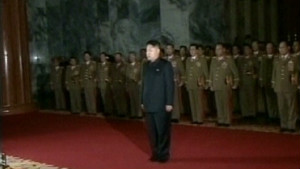 Anger from North Korea over sanctions
Anger from North Korea over sanctions 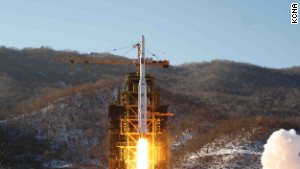 North Korea's nuclear ambitions
North Korea's nuclear ambitions 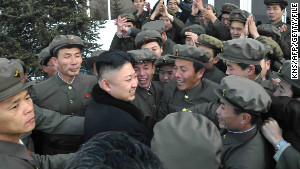 Flash Brief: North Korea nuclear
Flash Brief: North Korea nuclear 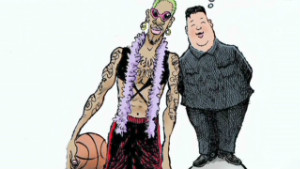 Rodman's bizarre trip to North Korea
Rodman's bizarre trip to North Korea Leading up to the vote, Pyongyang ratcheted up its bellicose rhetoric.
A spokesman for the North Korean foreign ministry suggested the United States "is set to light a fuse for a nuclear war."
As a result, North Korea "will exercise the right to a preemptive nuclear attack to destroy the strongholds of the aggressors and to defend the supreme interests of the country," the country said in a statement carried by the state-run Korean Central News Agency.
Despite the strong language, analysts say North Korea is years away from having the technology necessary to mount a nuclear warhead on a missile and aim it accurately at a target. And, analysts say, North Korea is unlikely to seek a direct military conflict with the United States, preferring instead to try to gain traction through threats and the buildup of its military deterrent.
But the threat came amid increased concern over Pyongyang's dogged efforts to advance its nuclear and missile technology after a recent long-range rocket launch and underground atomic blast.
On Tuesday, North Korea said it planned to scrap the armistice that stopped the Korean War in 1953 and warned it could carry out strikes against the United States and South Korea.
Analysts: 'Boxed in' North Korea's bluster 'particularly dangerous'
The rhetoric came not only in advance of the U.N. vote, but also as military drills take place on either side of the heavily armed border that divides the two Koreas.
This week, the United States and South Korean began two months of joint exercises, known as Foal Eagle. North Korea has called the annual training exercises "an open declaration of a war," but South Korea says it notified Pyongyang that the drills "are defensive in nature."
North Korea's nuclear threat Thursday "may suggest that Pyongyang feels even more boxed in than usual," said Michael Mazza of the American Enterprise Institute.
And while a nuclear attack itself is not an immediate palpable threat, "This surge in provocative rhetoric is particularly dangerous," added Michael Auslin, also with the institute. "South Korea's new president (Park Geun Hye) can't be seen to back down in the face of the North's threats, while (new North Korean leader) Kim Jong Un may feel that his successful missile and nuclear tests give him the ability to keep pressuring Seoul. The two may wind up talking themselves into conflict."
South Korea's U.N. Ambassador Kim Sook said Thursday the new resolution "reflects the will of the international community," which "will never tolerate North Korea's repeated violations and North Korea's nuclear and ballistic missile program."
"Each violation will be met by stronger responses and measures," he added.
Will the new sanctions work?
The goal of the new sanctions is to stymie the activities of North Korean banks and cash couriers who might be funneling money to the secretive regime's nuclear and missile programs.
It will be tougher for the regime to move large sums of cash stuffed into suitcases, Rice said.
The U.N. resolution also outlines measures to step up scrutiny of suspicious sea shipments and air cargo. And it expands restrictions to encompass several institutions and senior officials in the North's weapons industry, as well as a range of materials and technology known to be used in uranium enrichment.
It also blocks the sale of luxury goods -- such as yachts and certain high-end jewelry -- to North Korea.
"As a result, North Korea's ruling elite, who have been living large while impoverishing their people, will pay a price" for the ongoing nuclear activities, Rice said.
Some doubt whether the new measures will make much difference.
Sanctions imposed after previous nuclear tests and rocket launches have failed to deter Pyongyang.
China will go a long way toward determining whether the new sanctions really do have "bite," analysts say.
"As long as China allows North Korea to operate, as long as China provides food, energy assistance, and investment, the sanctions really don't matter," said Doug Bandow of the Cato Institute.
North Korea notoriously allows many of its people to live in malnutrition and starvation. Still, the country needs a functioning economy, partly to finance its military, Bandow explained.
"Kim Jong Un is now paying the price for going ahead with a nuclear test despite Chinese warnings not to create trouble during the political transition that has been under way in Beijing the past year," Mark Fitzpatrick, director of the Non-Proliferation and Disarmament Programme at the UK-based International Institute for Strategic Studies, said this week.
Future levels of Chinese grain sales to North Korea are a possible indicator of Beijing's commitment to putting meaningful pressure on Pyongyang, he said.
Ken Gause, an analyst with CNA, said the new sanctions won't deter North Korea from building up its nuclear program.
"North Korea last year inserted language into its constitution that the country is a nuclear power. To walk back from this, especially under pressure from the outside world, would undermine Kim Jong Un's legitimacy and make him vulnerable. He will not do this," said Gause.
North Korea casts U.N. sanctions as part of an aggressive, U.S.-led conspiracy against it.
READ: Report: North Korea threatens to end armistice
READ: Five things to know about North Korea's planned nuclear test
READ: Tough U.N. action vowed after North Korean nuclear test
Simmering tensions
North Korea said the underground nuclear blast it conducted February 12 was more powerful than its two previous detonations and used a smaller, lighter device, suggesting advances in its weapons program.
It was the first nuclear test the isolated state has carried out since Kim inherited power in December 2011 after the death of his father, Kim Jong Il, who made building up North Korea's military strength the focus of his 17-year rule.
The test followed the North's long-range rocket launch in December that succeeded in putting an object in orbit. Pyongyang insisted the launch had peaceful aims, but it was widely viewed as a test of its ballistic missile technology.
Long history
North and South Korea have technically been at war for decades. The 1950-53 civil war ended in a truce rather than a peace treaty.
China supported the North with materiel and troops in the Korean War. The United States backed the South in the conflict, with soldiers from the two countries fighting side by side. About 28,500 U.S. soldiers are currently stationed in South Korea.
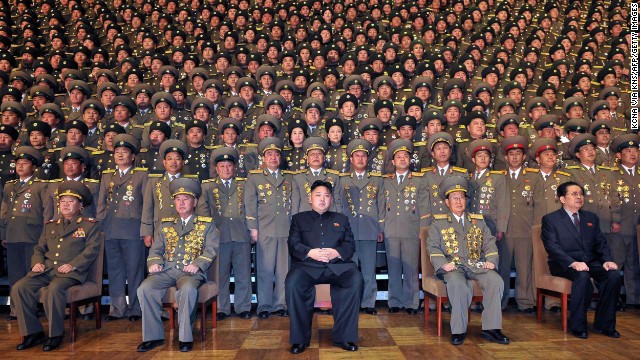 North Korean leader Kim Jong Un, center, poses with chiefs of branch social security stations in this undated picture released by North Korea's official news agency on November 27, 2012.
North Korean leader Kim Jong Un, center, poses with chiefs of branch social security stations in this undated picture released by North Korea's official news agency on November 27, 2012. 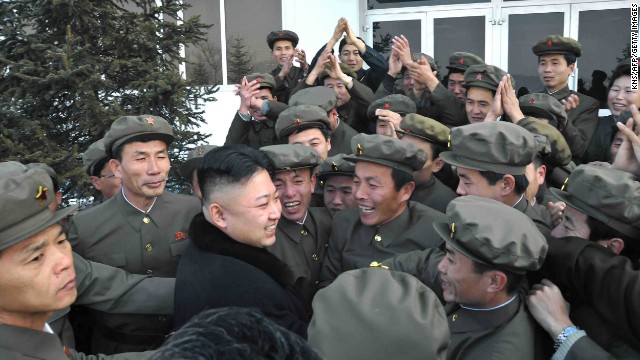 Kim celebrates with staff from the satellite control center in Pyongyang, North Korea, during the launch of a rocket carrying a satellite, in a photo released by the official North Korean news agency on December 12.
Kim celebrates with staff from the satellite control center in Pyongyang, North Korea, during the launch of a rocket carrying a satellite, in a photo released by the official North Korean news agency on December 12. 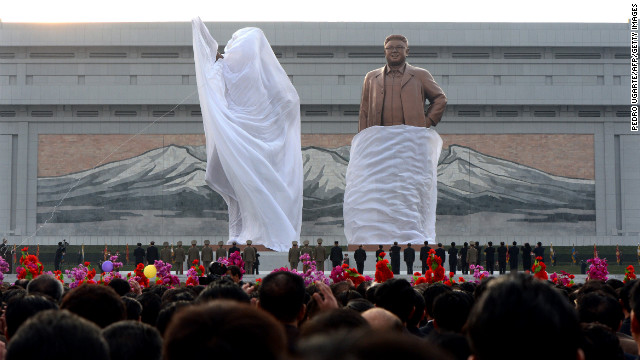 A crowd watches as statues of the nation's founder, Kim Il Sung, and his son Kim Jong Il are unveiled during a ceremony in Pyongyang on April 13, 2012. Photos from North Korea are rare, but the country was on full display in April 2012 as it celebrated the 100th birthday of Kim Il Sung.
A crowd watches as statues of the nation's founder, Kim Il Sung, and his son Kim Jong Il are unveiled during a ceremony in Pyongyang on April 13, 2012. Photos from North Korea are rare, but the country was on full display in April 2012 as it celebrated the 100th birthday of Kim Il Sung. 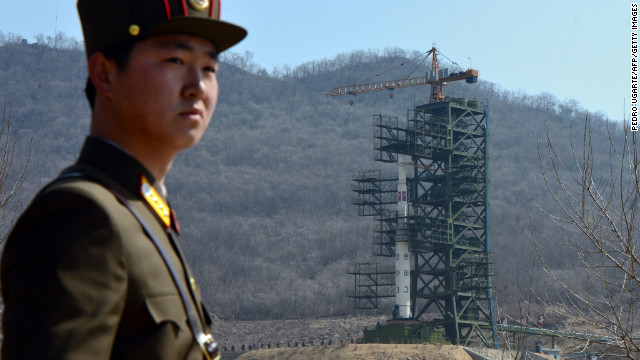 A North Korean soldier stands guard in front of an Unha-3 rocket at the Tangachai-ri Space Center on April 8, 2012.
A North Korean soldier stands guard in front of an Unha-3 rocket at the Tangachai-ri Space Center on April 8, 2012. 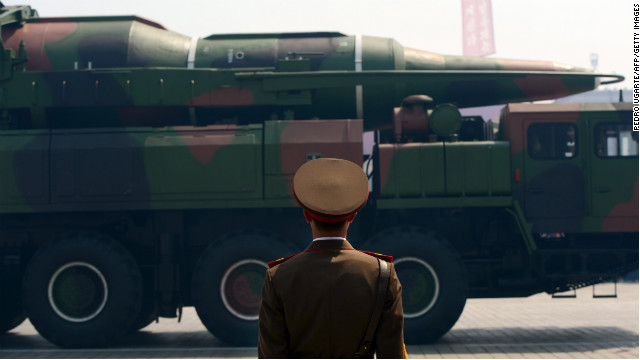 A military vehicle participates in a parade in Pyongyang on April 15, 2012.
A military vehicle participates in a parade in Pyongyang on April 15, 2012. 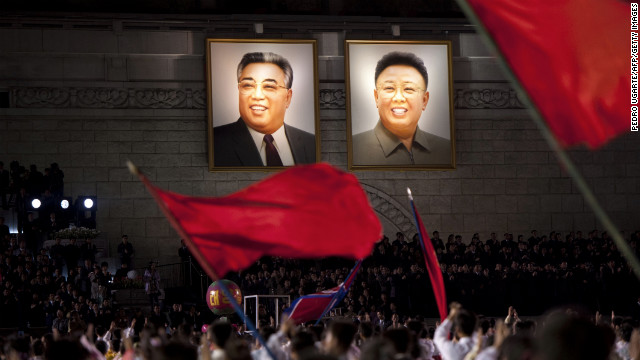 North Koreans wave flags in front of portraits of Kim Il Sung, left, and his son Kim Jong Il during celebrations to mark the 100th birth anniversary of Kim Il Sung in Pyongyang on April 16, 2012.
North Koreans wave flags in front of portraits of Kim Il Sung, left, and his son Kim Jong Il during celebrations to mark the 100th birth anniversary of Kim Il Sung in Pyongyang on April 16, 2012. 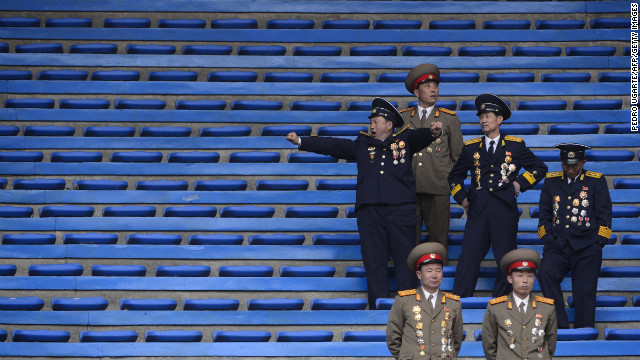 North Korean soldiers relax at the end of an official ceremony attended by leader Kim Jong Un at a stadium in Pyongyang on April 14, 2012.
North Korean soldiers relax at the end of an official ceremony attended by leader Kim Jong Un at a stadium in Pyongyang on April 14, 2012. 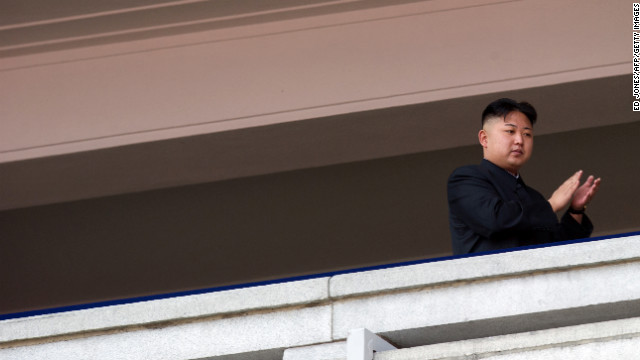 Kim Jong Un applauds as he watches a military parade in Pyongyang on April 15, 2012.
Kim Jong Un applauds as he watches a military parade in Pyongyang on April 15, 2012. 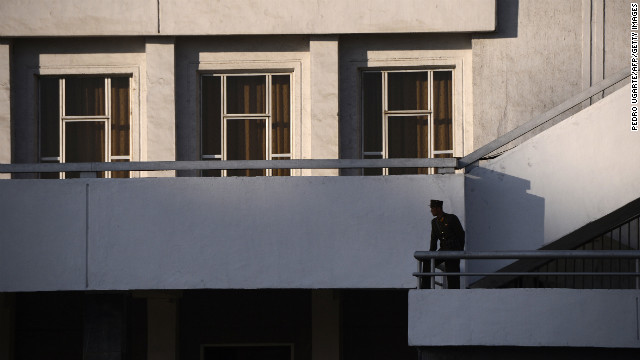 A North Korean soldier stands on a balcony in Pyongyang on April 16, 2012.
A North Korean soldier stands on a balcony in Pyongyang on April 16, 2012. 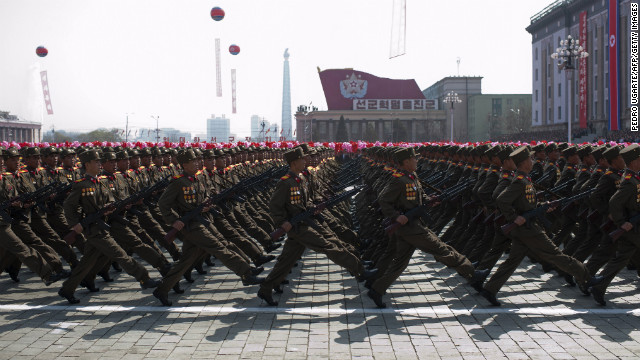 North Korean soldiers march during a military parade in Pyongyang on April 15, 2012.
North Korean soldiers march during a military parade in Pyongyang on April 15, 2012. 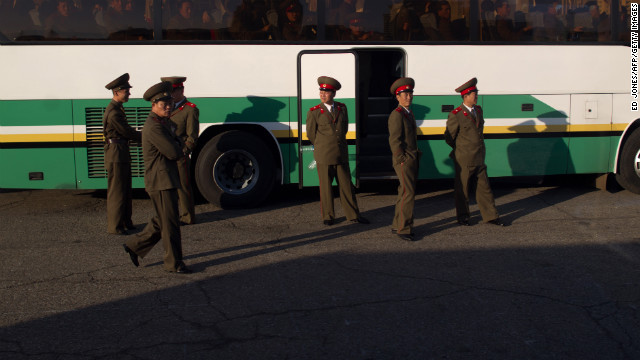 Soldiers board a bus outside a theater in Pyongyang on April 16, 2012.
Soldiers board a bus outside a theater in Pyongyang on April 16, 2012. 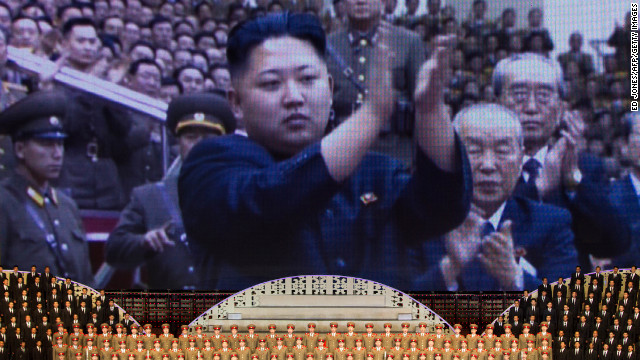 North Korean performers sit below a screen showing images of leader Kim Jong Un in Pyongyang on April 16, 2012.
North Korean performers sit below a screen showing images of leader Kim Jong Un in Pyongyang on April 16, 2012. 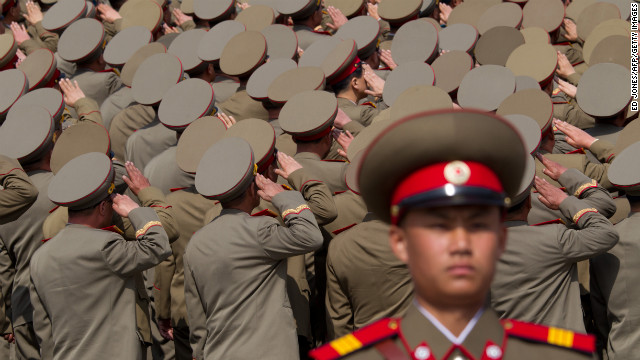 North Korean soldiers salute during a military parade in Pyongyang on April 15, 2012.
North Korean soldiers salute during a military parade in Pyongyang on April 15, 2012. 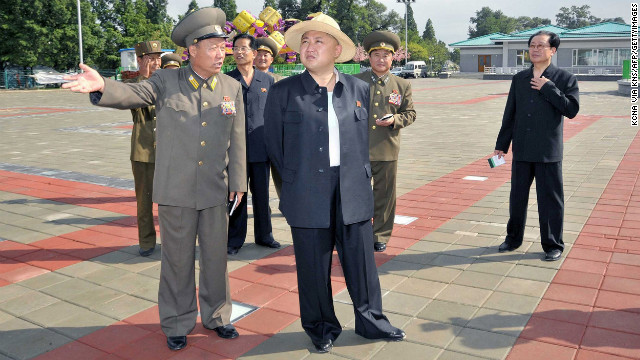 Kim Jong Un visits the Rungna People's Pleasure Ground, which is under construction in Pyongyang, in a photo released on July 3, 2012, by North Korea's official Korean Central News Agency.
Kim Jong Un visits the Rungna People's Pleasure Ground, which is under construction in Pyongyang, in a photo released on July 3, 2012, by North Korea's official Korean Central News Agency. 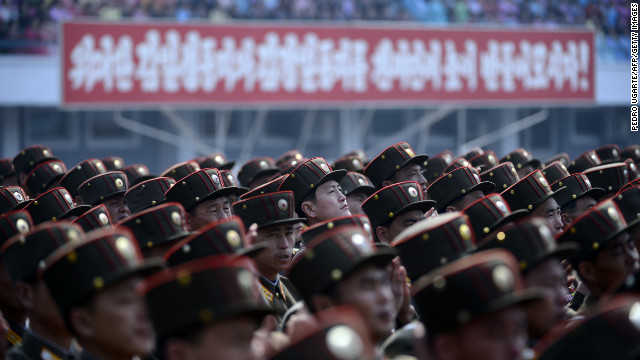 North Korean soldiers listen to a speech during an official ceremony attended by leader Kim Jong Un at a stadium in Pyongyang on April 14, 2012.
North Korean soldiers listen to a speech during an official ceremony attended by leader Kim Jong Un at a stadium in Pyongyang on April 14, 2012. 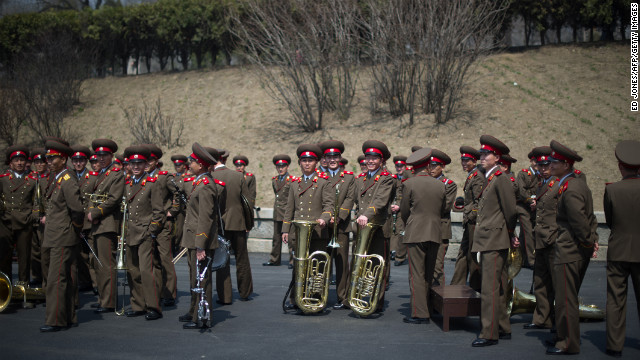 Members of a North Korean military band gather following an official ceremony at the Kim Il Sung stadium in Pyongyang on April 14, 2012.
Members of a North Korean military band gather following an official ceremony at the Kim Il Sung stadium in Pyongyang on April 14, 2012. 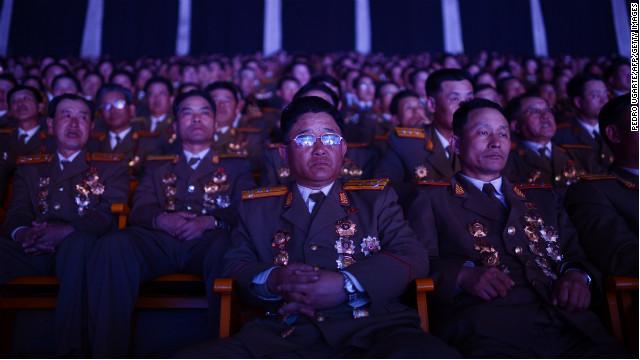 North Korean military personnel watch a performance in Pyongyang on April 16, 2012.
North Korean military personnel watch a performance in Pyongyang on April 16, 2012. 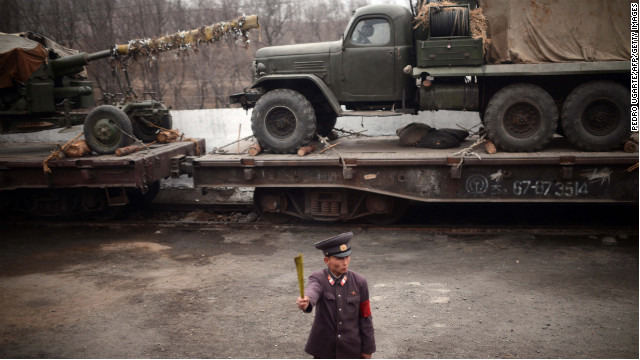 A North Korean controller is seen along the railway line between Pyongyang and North Pyongan province on April 8, 2012.
A North Korean controller is seen along the railway line between Pyongyang and North Pyongan province on April 8, 2012. 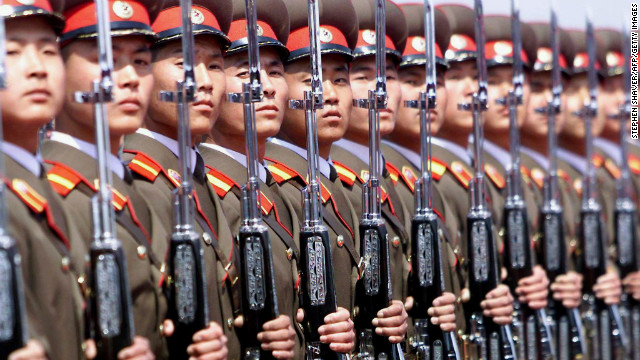 A North Korean military honor guard stands at attention at Pyongyang's airport during a diplomatic visit on May 2, 2001. Kim Jong Un and North Korea's military Kim Jong Un and North Korea's military Kim Jong Un and North Korea's military Kim Jong Un and North Korea's military Kim Jong Un and North Korea's military Kim Jong Un and North Korea's military Kim Jong Un and North Korea's military Kim Jong Un and North Korea's military Kim Jong Un and North Korea's military Kim Jong Un and North Korea's military Kim Jong Un and North Korea's military Kim Jong Un and North Korea's military Kim Jong Un and North Korea's military Kim Jong Un and North Korea's military Kim Jong Un and North Korea's military Kim Jong Un and North Korea's military Kim Jong Un and North Korea's military Kim Jong Un and North Korea's military Kim Jong Un and North Korea's military Kim Jong Un and North Korea's military HIDE CAPTION << <
A North Korean military honor guard stands at attention at Pyongyang's airport during a diplomatic visit on May 2, 2001. Kim Jong Un and North Korea's military Kim Jong Un and North Korea's military Kim Jong Un and North Korea's military Kim Jong Un and North Korea's military Kim Jong Un and North Korea's military Kim Jong Un and North Korea's military Kim Jong Un and North Korea's military Kim Jong Un and North Korea's military Kim Jong Un and North Korea's military Kim Jong Un and North Korea's military Kim Jong Un and North Korea's military Kim Jong Un and North Korea's military Kim Jong Un and North Korea's military Kim Jong Un and North Korea's military Kim Jong Un and North Korea's military Kim Jong Un and North Korea's military Kim Jong Un and North Korea's military Kim Jong Un and North Korea's military Kim Jong Un and North Korea's military Kim Jong Un and North Korea's military HIDE CAPTION << <
{ 0 comments... read them below or add one }
Post a Comment